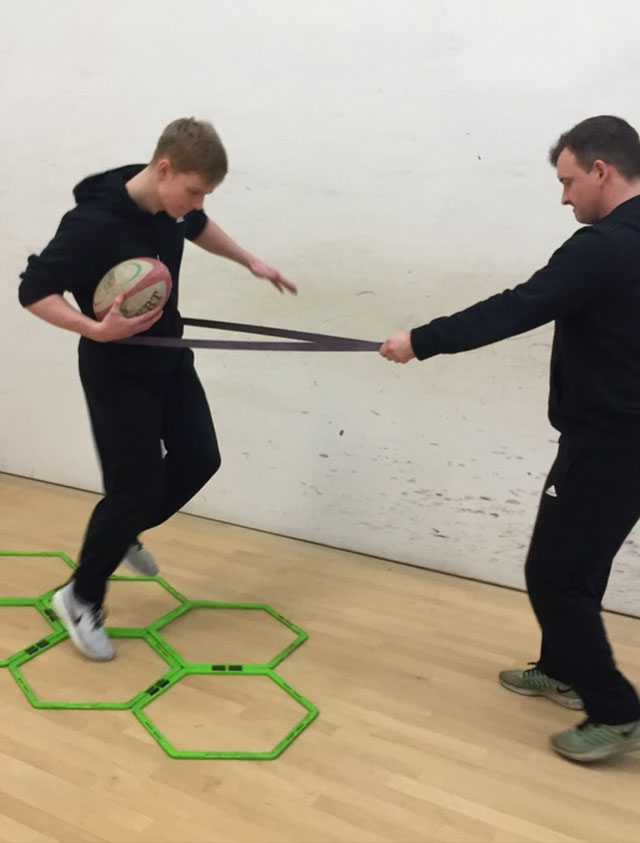Finding an online fitness coach can be intimidating. It can be tricky to know where to start and who to trust. Sure, everyone seems to be on social media claiming to be a fitness professional, but how do you know which one is right for you? Do you go for the one with the flashiest photos and the deep abs, or the one with the cool hashtags and the most followers? It can be hard to sort the marketing hype from the real deal. That’s why we’ve created this guide on How To Find The Right Online Fitness Coach For You. Here, we’ll walk you through the process of navigating a sea of online coaches and pinpointing the one that will provide you with the best and most effective programme for you and your goals. So, if you’re ready to get serious about finding the right online fitness coach for you, let’s dive in!
Quick Summary
The best way to find the right online fitness coach for you is to read reviews from those who have used their services. Taking into account your budget and goals, you should also research their certifications and qualifications before making any decisions.

Research and Criteria for Choosing an Online Fitness Coach
Research is an important step in the process of finding the right coach for you. Criteria to consider when choosing a coach include their qualifications, experience, specialties and education. Additionally, look into what clients they have worked with in the past, as this can provide valuable insight into the kind of work they do. Seek out reviews and feedback from past clients as well to get an idea of the client-coach dynamic.
When it comes to qualifications and experience, look for a fitness coach that can back up their claims with evidence. Professional certifications and educational degrees are especially relevant for this; many online trainers will display qualifications like these on their profile or website. Specialties may be a bit more personal and depend on the type of guidance and support you’re looking for; research coaches that offer different approaches tailored to your individual needs.
By researching a variety of coaches, you can make an informed decision about who might be best for you. Once you’ve identified potential coaches, reach out with any questions you may have so that you can learn more about their approach and determine if they’re right for you.
With research and criteria in mind, it’s time to figure out what it is exactly that makes a great coach for you – what are the qualities and experiences you’re looking for in order to find someone that meets your individual needs?
Most Important Points
When looking to find a fitness coach, it’s important to do research and consider factors such as qualifications, experience, specialties and education. Look into previous clients and reviews for insight into the client-coach dynamic. Make sure to check certifications and educational degrees before deciding on a coach, and ensure that their approaches are tailored to your individual needs. Ask any questions you may have in order to gain further insight about the coach’s approach in order to decide if they will meet your individual needs.
What Are You Looking for in a Coach?
Once you have completed your research and defined the criteria for choosing an online fitness coach, your next step is to figure out what exactly you are looking for in a coach. Are you looking for someone who can provide personalised one-on-one instruction? Do you prefer more general advice and guidance with some routine planning assistance? Do you need an individual to provide support and accountability but that can also give you the freedom to customise your programme as desired? It is important to set your expectations clearly so that you can make sure your chosen online coach can meet them.
Some of the things that should be considered when selecting an online fitness coach include personality, experience, specialty area, communication style, and fee structure. In terms of personality, it is important that the coach has similar values and outlooks to those held by the individual seeking coaching. Experience should also be taken into consideration along with their particular specialty area. For example, someone wanting to lose weight may benefit from a coach with a background in nutrition or another health-related discipline. It is also important to consider if there is compatibility in regards to communication style and be mindful of the cost associated with hiring an online coach.
When selecting an online fitness coach, it is critical that all aspects of their services are carefully considered in order to ensure the best results for both parties. After evaluating these elements, individuals can move forward with confidence knowing they have chosen the right online fitness coach for their needs. With this information in hand, they can now proceed to the selection process for completing their hire.
Selection Process for Hiring an Online Fitness Coach
Once you’ve established what your fitness goals are and thought of the qualities you would like to see in an online fitness coach, it’s time to move on to the selection process. Selecting a coach should be done with care and planning; it should feel like you’re going through each candidate objectively and rationally here.
It may be tempting to go for the most famous or popular online coach out there, but remember that being “famous” is typically not enough qualification for the job. Evaluating each selection based solely on their credentials, experience, and results can help make sure you select the best one for your needs. Do not rush into hiring the first person you find; do your research, read reviews from other clients, and have a conversation before making a decision. Not all coaches are equal and some may not even empathise with your individual goals.
Having said that, there is also no need to base your decision solely on a coach’s qualifications either. There is something to be said about competence alone, which could translate into better results once they start working with you. But if you want someone who actually understands where you are coming from and has been through something similar themselves, people skills might then become more important than experience. Depending on how personal or hands-on you would like this relationship to be, both qualifications and empathy can play an important role here.
It is ultimately up to you when choosing the right online fitness coach for yourself; weigh the pros and cons of each individual factor accordingly. Finding someone knowledgeable and experienced is key, but do not forget that having an understanding coach makes it easier to stay motivated and confident even when things become difficult. With these considerations in mind, take your time in selecting the right fit for yourself so as to ensure success throughout your journey towards optimal health.
Once you have made your selection and have decided on an online fitness coach suitable for your needs, the next step is to evaluate any fee structures associated with his or her services.
- According to a survey by the American College of Sports Medicine, 42% of people have used online trainers in 2020.
- A study published in 2019 found that 87% of online personal trainers rated their overall experience as “good” or “excellent”.
- A 2016 survey found that 77% of online personal trainers indicated an improved state of health post training and 83% saw an improved quality of life.
Fee Structures Depending on Qualifications
Fee structures for online fitness coaches will depend on their qualifications and the particular services provided. The more knowledgeable and experienced a coach, the higher the fee they can charge. Many experts advise to inquire directly about fees and negotiate, if possible, to receive the best rate.
For those on a budget, or with limited resources, industry standards suggest hiring a coach with at least a certification in strength and conditioning or related field and ample reviews from other clients. Higher level certifications such as master’s degrees in kinesiology or exercise science may be costlier but also offer the benefit of personalised care and expertise tailored towards individualised goals.
When it comes to fee structures, it’s important to weigh the pros and cons of going with an accredited professional who offers exceptional skills for a higher fee versus an entry-level coach who may be more affordable but lack professional credentials. According to a recent survey by Harvard Health Publications, 95% of respondents reported satisfaction when working with certified coaches rather than those without such accreditations, regardless of the seniority level and price tag.
No matter what option you choose, make sure your potential online fitness coach is qualified in their craft and able to provide evidence that their approach works. Asking questions and verifying credentials will help ensure you get your money’s worth. Once you’ve gained assurance in the quality of your coach’s services, it’s time to move on to looking at ways to guarantee your fitness results with effective quality assurance measures.

Quality Assurance Measures for Online Coaches
Given the rising popularity of online fitness coaching and the ease of access they provide, quality assurance measures to ensure consumers get what they’re paying for must also be taken into account. On one hand, some may argue that higher rates should equal higher quality, so coaches charging a heavier fee ought to be held to higher standards. Admittedly, this is often true; a more experienced or renowned coach will generally cost more, but there are no guarantees the extra money equates to improved services. Ultimately, it’s important to take a closer look at the coach’s qualifications and credentials before signing up in order to determine if their services are worth the price.
On the other hand, many potential clients are inclined to cheaper offers regardless of teacher experience, as not everyone has lots of disposable income to spare on coaching fees. While these cheaper packages may offer convenience and cost savings in the short term, this affordability may come with a hidden expense; under-qualified or inexperienced coaches unable or unwilling to provide essential assistance in reaching desired fitness goals. Doing extensive research prior to investing in any programme can help you understand how reputable the coach is before you make any financial commitments.
Moreover, particular attention should also be paid towards any reviews available from previous customers who have worked with an online fitness coach. Such testimonials can supply invaluable insight into how successful a given coach’s methods are and verify their claim to certain qualifications and credentials. When it comes down to quality assurance for online trainers, researching their background and reading customer reviews are vital steps in ensuring your investment pays off.
Once you’ve found someone you think is qualified and trustworthy enough for your needs, as with all things involving finances, it doesn’t hurt to know exactly what you’re getting yourself into. The next step is determining if the potential benefits usually associated with hiring an online fitness coach outweigh their respective costs; something that requires taking a closer look at their qualifications in order to be assured of your purchase.
How to Ensure Your Coach is Qualified
When it comes to finding the right online fitness coach for you, quality assurance measures are essential. But just as important is ensuring your coaches are qualified, have the proper certifications, and that their services are up to industry standards.
There is debate about what measures should be taken to ensure that a potential coach is certified and qualified. Proponents of government regulations assert that this is necessary in order to protect consumers from uncertified coaches. They argue that these regulations would help vet potential coaches against certain criteria before they could offer services, similar to how personal trainers must be certified and licenced before they become eligible to work at gyms. These initiatives would also require coaches to abide by specific rules and regulations designed to maintain the highest quality of service — thus protecting consumers from fake credentials or limited knowledge base.
On the other hand, opponents of government regulation suggest that implementing stricter measures could discourage talented individuals without lots of experience or a formal education from becoming a fitness coach simply due to bureaucratic red tape. In addition, this could impede on many individuals’ ability to join the fitness industry if they don’t meet the established governmental requirements.
The type of qualifications required should definitely depend on the type of service provided. For example, if a person is offering exercise advice or programmes, research has shown that holding at least an associate degree in exercise science can increase trust in their clients — as well as providing evidence-based coaching methods. No matter the service provided, it’s important for potential clients to make sure their coach holds an appropriate certification or relevant degree — such as ACSM Certified Exercise Physiologist or NSCA Certified Strength & Conditioning Specialist — especially when working with athletes.
To be sure you’re getting the best quality services for your needs and the best value for your money, it pays off to take extra care ensuring that any potential online fitness coach can actually deliver on their promise in terms of professionalism and expertise. When researching potential coaches, never be afraid to ask questions — no matter how hard they may seem — as long as they’re asked respectfully. Asking these questions will also help clients decide whether they want to move forward with them or not.
No matter which approach you end up taking, finding an online fitness coach who is reliable and qualified should always remain top priority when seeking out a trainer or programme provider – which includes understanding different types of training available like class-based vs self-led programmes. By doing your research ahead of time and making sure you understand what type of coaching suits your goals best, you’ll be able to better make an informed decision when choosing the right option for you that’s both safe and worthwhile.
Class-Based vs Self-Led Programmes
Now that you’ve established how to ensure your online fitness coach is qualified, it’s time to move on and consider the different training programmes they offer. Specifically, some online coaches offer class-based programmes while others only offer self-led programmes. It’s important to consider both options to determine which programme works best for you.
Class-based programmes usually have their own structure and are led by a fitness coach or instructor. The goal of this kind of programme is to provide education and guidance for clients through instruction in the form of various exercises, drills, and activities. An example of this kind of programme might include a series of weekly Zoom meetings with a coach guiding you through a workout planned and tailored to your specific needs. Additionally, many class-based programmes will require additional accountability checks between classes and may also include mental health elements as part of the programme.
Advocates of class-based programmes often argue that they are ideal for those who are new to working out since they provide structure, instruction, and support. Such trainers often come with years of experience in providing structured plans, setting achievable goals, motivating clients during difficult times, and answering questions clients may have about all the different aspects of an exercise plan.
On the other hand, self-led programmes typically feature an individualised plan with minimal guidance from a fitness coach or instructor. These types of programmes can be as simple as accessing a library of pre-written workout plans or videos from an app or website or as complicated as building your own plan specifically tailored to meet your own needs and goals. The downside to self-led programmes is that the individual has to be very motivated and disciplined in order to stick with the programme long enough to see good results. This lack of support makes it easy for someone to become discouraged or lost along the journey due to lack of direction and feedback from an experienced trainer.
No matter what kind of programme you decide is right for you, it’s important to make sure that each programme has clear objectives in terms of duration and performance standards – i.e., do you expect significant gains in strength within two weeks? Do you want your body fat percentage reduced by 10% in one month? Having these goals outlined will help avoid any potential confusion down the road when measuring progress against expectations. When considering class-based vs self-led programmes, it’s essential to factor what fits best into your lifestyle so you can stay consistent in order to get results!
Common Questions and Explanations
What should I expect from an online fitness coaching programme?
An online fitness coaching programme should offer tailored workouts and nutrition plans, personalised guidance and support from an experienced coach, and accountability to help you stay on track with your goals. Your coach should provide clear communication about the program’s schedule and expectations and be available for regular check-ins to ensure that you are progressing. Your coach should also provide education about proper form and exercise techniques, as well as information about developing healthy habits that will last a lifetime. Lastly, look for a programme that offers measurable results so you can track your progress over time and adjust accordingly.
What qualifications should I look for in an online fitness coach?
As you search for the right online fitness coach, you should consider several qualifications that can help you determine who would be a good fit for you.
First, it’s important to ensure that your fitness coach is certified in their field of expertise. Look for evidence of certifications from accredited organisations such as the American College of Sports Medicine or National Council on Strength and Fitness. Ask questions and make sure your trainer has true credentials before signing up for any services.
Second, evaluate their experience and track record. How long have they been a fitness coach? What successes have their former clients achieved? What types of programmes do they offer, and what strategies do they use to deliver those results? This will give you a better understanding of whether the coach is well-suited to helping you reach your goals.
Third, seek feedback from other people who have already gone through the training process with this particular trainer. Have they seen any improvements in their health or physique? Are they happy with the coach’s techniques and approach? Collecting reviews from current and former clients can help give you an unbiased opinion on whether a potential trainer is right for you or not.
Finally, assess how compatible you are with your prospective fitness coach. Do you find their teaching style motivating and enjoyable? Does their personality feel like a good match with yours? Do they take the time to answer your questions and give detailed explanations? Having compatibility with your trainer is just as important as having knowledge and qualifications; without it, achieving success will be difficult no matter how talented they may be.
By ensuring these qualifications, you’ll maximise your chances of building a strong relationship with your online fitness coach and seeing lasting results.
How do I evaluate an online coach’s track record?
When evaluating an online coach’s track record, it is important to see what their clients have said about them. A good way to do this is through reviews or testimonials that can be found on the coach’s website, social media accounts, or other platforms such as Yelp. Make sure you read multiple reviews from different clients to get an accurate picture of the coach.
In addition to reading up on reviews, ask the coach for details about their experience and qualifications. Do they have any specific certifications or degrees related to fitness? Are they a certified personal trainer? How long have they been working with online clients? It’s also important to ask if they have any success stories of clients who have achieved their goals under their guidance. You may even want to request contact information for some of these past clients so that you can speak to them directly and hear their opinions first-hand.
By thoroughly researching an online fitness coach’s track record and asking the right questions, you can make sure they are the right person to help you reach your goals.





